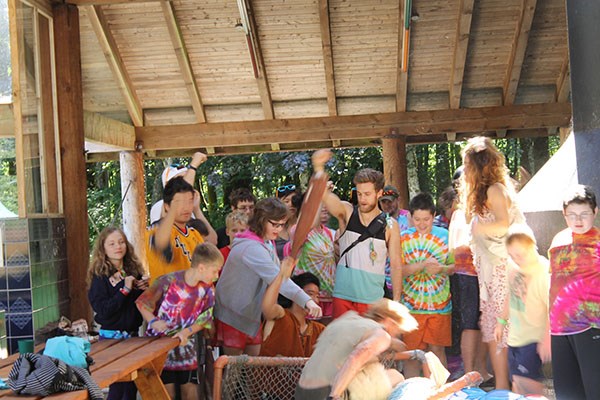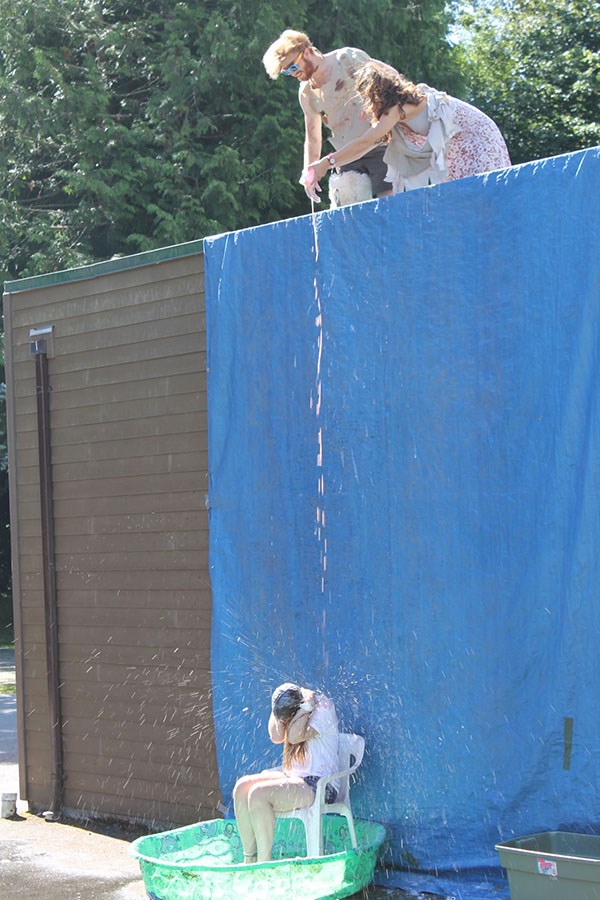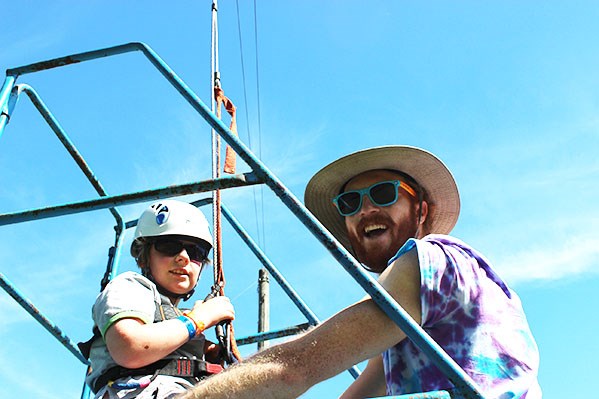The trap is set. It’s made of string, plastic bottles, blankets and a hockey net. Campers and counsellors intently watch the movements of an elaborately fashioned T-rex as it snoops about and nears the trap.
Counsellors dressed as cavemen spring forth and ensnare the T-rex. A victorious roar from the campers confirms that the kids love it. They escort the villainous dino, who has caused so much mischief all week at camp, to trial at the famed Kangaroo Court. The punishment: buckets of green goo dumped from the roof down onto its head and cold showers from a garden hose. Next, counsellors who have been charged by their campers are put to trial for things like bouncing too high on the trampoline, wearing a hat in the dining room, loud burping and other such offences. Kangaroo Court is a long-standing tradition held at the end of each session of camp.
Each summer since 1972, youth aged six to 18 who have a physical or mental disability have attended the Squamish Easter Seals Camp on Government Road. Campers come for a week at a time and participate in activities like swimming in the pool, climbing the rock wall, canoeing in Alice Lake, taking trips into the community, and playing at whatever other games creativity and ingenuity can devise.
Historically, there have been more applicants for camp than can be accommodated. This year, though, the number of campers attending Camp Squamish is down. This is the case as well for Winfield and Shawnigan Lake, the other two Easter Seals camps in British Columbia.
Jim Saunders has been involved with camp since 2009 and this year he’s the head coordinator at Squamish. He has noticed a change.
“A couple of years ago for any week of the summer, there would be so many campers who would want to come that we’d have to turn some away or we’d have to accept a few more than the standard 48. Now, there are some weeks we’re barely half full, so it’s really weird to see so much change in the program.”
In past years, the cost (about $2,400 per camper per week) of sending a kid to camp was covered entirely by the Easter Seals Society. But the society has recently opted to implement a fee for families sending a kid camp. Last summer (2013), it cost families $100 and this year the fee is $500.
A subsidy is available to families for whom the cost is burdensome. At the time of application they can request some or all of it be waived. So far, 11 per cent of applicants have had the cost of camp partly or entirely subsidized. Nevertheless, enrolment at the camp is down.
This summer, 27 campers attended Week 1— down from 39 campers in the first week of 2013 and 47 in the first week of both 2012 and 2011. There are a few other changes for 2014 at Camp Squamish: the maximum number of campers is capped at 42 — previously 48, there are five weeks of camp as compared to six, and, the number staff has been reduced from 40 to 32.
Chantelle LaRocque has worked in the kitchen at Camp Squamish since 2001 and is now the head chef. She notes the challenges of continuing to make nourishing meals for the campers, staff and volunteers who come to camp.
“Basically, there’s not much money. We have to cut back and budget better, so I’ve been changing the menu and trying to make it more cost efficient. I try to figure out how to manage the food out take right in terms of making sure there’s no waste, catering to everyoness needs, making sure the budget is at a decent place.”
Raising money as a not-profit is a difficult thing to do. It is becoming increasingly challenging for the Easter Seals Society to raise the capital necessary to continue offering free camp for kids. The society owns and operates the Easter Seals House (a “home away from home” for families visiting Vancouver to obtain medical treatment) and the three camps — for which all of the food, counsellors and maintenance required is expensive.
The new fee is an unfortunate reality of increasing competition for funding in the not-for-profit sector, says Stephen Miller, B.C. Easter Seals Society president.
“In order for us to continue these services, we need to figure out where revenues are going to come from to pay for all the counsellors, maintenance of the facilities and activities. The problem is, if we continue not to charge a fee, in 10 years from now, we wouldn’t have a camp left, we wouldn’t have a service left. Our goal is to continue providing the services for the next 15-plus years.”

The Vancouver 24-hour relay challenges corporate or recreational groups to run or walk for 24 hours and raise funds for the society by collecting pledges. It is held annually in June but is in decline.
“There was a 20- or 25-year period where it was producing in the seven figures in terms of a net, and now the numbers are much, much lower because of a change of demographics out there and people wanting to do other things and that has hurt our funding,” Miller says.
“When the relay started 35 years ago, there was hardly any other events by charities. Within the last 10 years or so, everybody [other organizations trying to raise capital] believes they can do a run, a walk, a bicycle ride, an obstacle course, whatever it is and because of that, we end up all competing for the same dollars.”
The Easter Seals Society recognizes the importance of coming up with new events as part of its fundraising strategy. Woman2Warrior event is an obstacle course event held in Vancouver that raised $150,000 this past May. The Splash of Colour Family Fun run was held in April in Victoria, Vernon and Kelowna this year. As well, the society is considering moving the 24-hour relays to the camps instead of at the stadiums where they are presently held. A pilot for next summer’s relay on Vancouver Island is planned for Shawnigan Lake instead of University of Victoria’s Centennial Stadium.
The staff at Camp Squamish is pleased that the program budget remains unaffected despite other alterations around camp. Though it is a small cost proportional to the other operating expenses, the current budget allows for the exciting and fun-loving environment which makes camp the place it is.
The staff, however, is concerned for the future. Eric Eaton is another of the coordinators at Squamish this year.
“There’s less enrolment of younger campers and so going forward is a concern. That first week for a new camper is like a test run,” Eaton says. “Ninety-five per cent of campers fall in love with this place and because of that $500 barrier, it’s tough for parents to justify sending their kids away that first week. Ten years down the road, we’re not going to have the same [number of] teen campers and there are a fewer younger campers coming.”
Saunders, whose younger sister was a camper at Squamish, elaborates on how the program benefits its participants.
“I can’t tell you the number of times I’d see my sister at her elementary school just sitting around by herself at recess; kids would play beside her, not with her.
“The peer interaction and friendships formed during school or in extracurricular programs are not so easy to come by for children with disabilities. It took a lot of searching and determination on the part of my family to find programs that provide positive social situations for her. Camp is one of these programs. It provides an environment that is designed for kids with disabilities. It supports them and gives them a sense of belonging and community.
“Camp is only for one week of the whole year, but in that week, campers can realize that they are not alone and that there are people out there they can relate to.”
Kangaroo Court is wrapping up now. Everyone is dispersing to the swimming pool, craft-making area and trampolines. Not many counsellors have avoided getting “goo” on them somewhere. For the remainder of the day, campers and counsellors will hang out, make some crafts, swim in the pool, or maybe go for a ride on the big swing and then they’ll get ready for the end-of-week banquet.
The kids at Camp Squamish are having an uplifting experience, just like thousands before them. Unfortunately, this year, there just aren’t as many.




